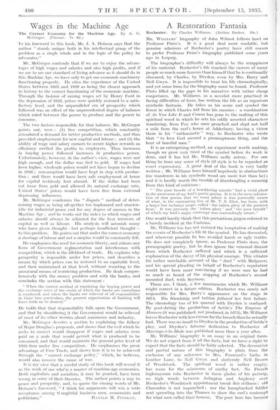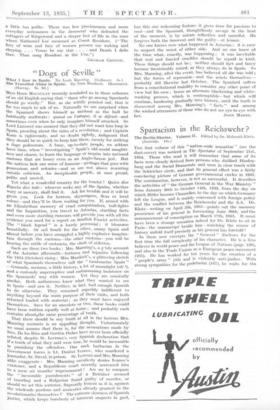A Restoration Fantasia .
Rochester. By Charles Williams. (Arthur Barker. 10s.)
Ma. WILLIAMS' biography of John Wilmot follows hard on Professor Pinto's. It is a good deal more readable, but genuine admirers of Rochester's poetry have still reason to prefer Professor Print's biography published some years ago in Leipzig.
The biographer's difficulty will always be the scrappiness of his material. Rochester's life touched the careers of many people so much more famous than himself that lie is continually obscured, by Charles, by Dryden, even by Mrs. Barry and Nell Gwyn. It is impossible to treat his life chronologically, and yet some form for the biography must be. found.. Professor Pinto filled up the gaps in his narrative with rather cheap conjectures. Mr. Williams, as a novelist more practised in
facing difficulties of form, has written the life as an ingenious symbolic fantasia. He takes as his scene and symbol the forest in which Charles hid from his enemies : a combination of As You Like It and Counts has gone to the making of this spiritual wood in which he sets his oddly assorted characters wandering, from Fox who once preached and slept not half a mile from the earl's house at Adderbury, having a vision there in his " enthusiastic " way, to Rochester who wrote that " to love God seemed a presumptuous thing, and the
heat of fanciful men."
It is an enterprising method, an experiment worth making, though we grow very tired of the -symbol before its work is done, and it has led Mr. Williams sadly astray. For one thing he loses any sense of style (if style is to be regarded as exact expression). A great deal of the book is very badly written ; Mir. Williams loses himself hopelessly in abstractions (no wanderers in his symbolic wood are more lost than he) ; and it is hardly worth the trouble of disentangling a meaning from this kind' of criticism :
" ' The poor benefit of a bewildering minute ' had a vivid place in the awareness of ray lord's poetic genius, it is in the mere admira- tion of that genius that we must admit it was poetically' aware of what, in the contrasting line of Mr. T. S. Eliot, has been, with a larger but inclusive scope, called the infirm glory of the positive hour.' it was 'precisely the infirm glory ' and ` the poor benefit of which my lord's angry contempt was contendingly aware,"
Qne would hardly think that this pretentious, jargon referred to a bawdy incident at the Customs.
Mr. Williams too has not resisted the temptation of making the events of Rochester's life fit the symbol. He has decorated, and wherever possible he has avoided harsh or ugly truths. He does not completely ignore, as Professor Pinto does, the pornographic poetry, but he does ignore the venereal disease from which Rochester suffered and which is a sufficient explanation of the decay of his physical courage. This vitiates his rather unreliable account of the " duel " with Mulgrave, and his special pleading on behalf of Rochester's reputation would have been more convincing if we were sure he had so much as heard of the stopping of Rochester's second mounted duel, with Seymore.
There are, I think, a few inaccuracies which Mr. Williams might correct in a future edition. Rochester was surely not responsible for Mrs. Barry's appearance on the stage in 1674. His friendship and tuition followed her first failure.
The chronology too of his quarrel with Dryden is confused. By post-dating the production of Settle's The Empress of
Morocco (it was published, not produced,in 1673), Mr. Williams leaves Rochester with less excuse for the breach than he actually had. There was no insult to Dryden in the production of Settle's play, and Dryden's fulsome dedication to Rochester of Marriage-a-la-Mode was published more than a year after.
Mr. Williams' biography is an essay in an original form. We do not expect from it all the facts, but we have a right to
expect that the facts should be fairly selected. The decorative and partial nature of this biography is plain from the exclusion of any reference to Mrs. Fourcard's baths in Leather Lane, to Nell Gwyn and slatternly Nell Brown of Woodstock. The spiritual wood is rather empty, has room for the minimum of earthy fact. No French highwayman robs Rochester in these glades of his periwig, no high words between Arlington and Anglesey over Rochester's Woodstock appointment break this stillness ; old Clarendon is not impeached ; rior the humpbacked fiddler sent sprawling into the Thames to show the earl's contempt for what men called their honour. The poet here has become
'a little too. polite. There was less preciousness and more everyday seriousness in the democrat who defended. the cottagers of Kisigswood and a deeper lust of lifts in the man whom Nathaniel Lee mourned as Count Rosidore. The fury of wine and fury of women possess me waking and sleeping. . . . Venus be my star . . . . and Death I defie thee. Thus sung Rosidore in the Urn.")
GRAIIAM GREENE.







































 Previous page
Previous page